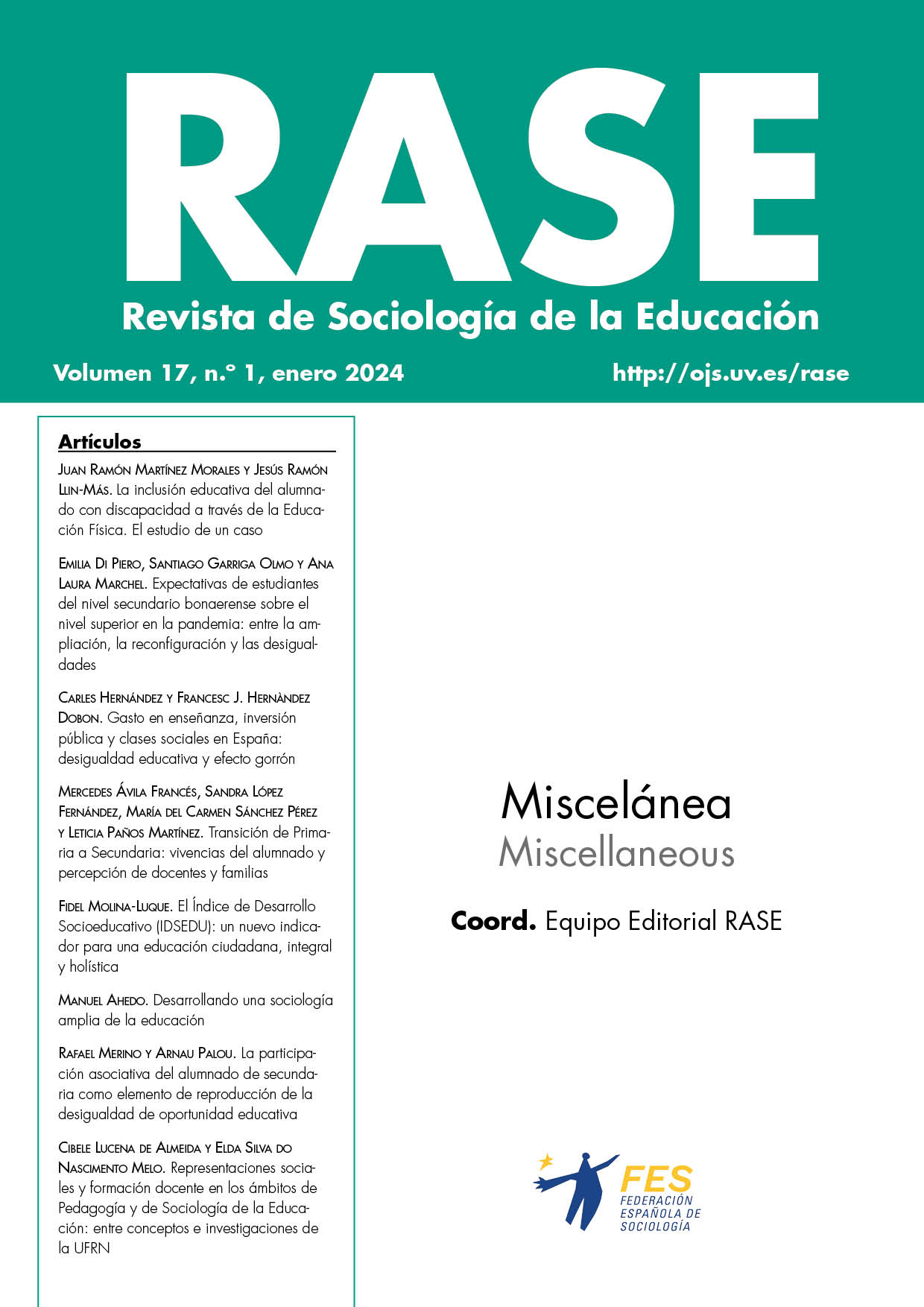The Socio-Educational Development Index (IDSEDU): a new indicator for an integral and holistic education of citizenship
DOI:
https://doi.org/10.7203/RASE.17.1.27972Keywords:
index, indicators, profiguration, education, socialization, educating city Abstract
Abstract
This article is the result of qualitative research, within the framework of previous work on Grounded Theory (2011-2021), used for the development of a City Educational Project (PEC, acronym in Spanish), in which an innovative Index of Socio-educational Development (IDSEDU, 2021) which aims to evaluate and validate the different educational policies from the different departments of a city council (of an educating city). A preliminary bibliographic and documentary analysis has been carried out for two years (2022 and 2023) to consolidate the theoretical and conceptual framework, and the comparison with other examples of educating cities. Four work teams have been organized to analyze the information and debate around the initial question about what it means to be an educating city and the purpose of a PEC, within the framework of a SWOT analysis, looking for Strengths, Weaknesses, Opportunities and Threats, and in a diagnosis that is as complete as possible. In this sense, a total of 45 in-depth interviews and 2 Focus Groups have been carried out. The result is an index that is not prescriptive, but rather indicative, which offers a framework for understanding reality and, at the same time, a framework for action and social transformation. It is an index that is also a decalogue of principles of action, to ensure an Inclusive, Intercultural and Intergenerational city, that overcomes discrimination (the -isms: racism, classism, patriarchalism and ageism), and that identifies the axes of Education in Solidarity, Sustainability and Profigurative Socialization.
 Downloads
Downloads
 References
References
Bericat, E. (2000): “La sociología de la emoción y la emoción en sociología”. Papers, 62: 145-150.
Booth, T. & Ainscow, M. (2000). Index for inclusion. London, CSIE “Centre for Studies on Inclusive Education” Mark Vaughan.
Carrero, V.; Soriano, R. M. y Trinidad, A. (2012). Teoría fundamentada, Grounded Theory. El desarrollo de teoría desde la generalización conceptual. Madrid, Centro de Investigaciones Sociológicas (CIS).
Cerioni, L.L.; Donnini, N.E. y Morresi, S. (2010): “Aplicación de indicadores cuali-cuantitativos para evaluar un programa de admisión a la educación superior”. X Coloquio Internacional sobre Gestión Universitaria en América del Sur.
https://core.ac.uk/display/30377638?utm_source=pdf&utm_medium=banner&utm_campaign=pdf-decoration-v1- oai:repositorio.ufsc.br:123456789/96616
Elias, N. (1970). Sociología Fundamental. Barcelona, Gedisa, 2008.
Gründler, K. and Krieger, T. (2021): “Using Machine Learning for measuring democracy: A practitioners guide and a new updated dataset for 186 countries from 1919 to 2019”. European Journal of Political Economy, 70, 102047. DOI: 10.1016/j.ejpoleco.2021.102047.
Molina-Luque, F. (2017): “Calidad de vida y Socialización Profigurativa: consideraciones éticas sobre investigación en educación y en salud”. Educación, Salud y Calidad de Vida. Barcelona, Graó, p. 151-165.
Molina-Luque, F. (2019): “Profiguración, acción creativa intercultural e innovación social: renovarse o morir en Rapa Nui (Isla de Pascua/ Easter Island)”. Revista Latinoamericana de Estudios sobre Cuerpos, Emociones y Sociedad (RELACES), 29: 71-81.
Molina-Luque, F. (2020): “The Art of Living as a Community: Profiguration, Sustainability, and Social Development in Rapa Nui”. Sustainability, 12 (17): 6798. DOI: https://doi.org/10.3390/su12176798
Molina-Luque, F. (2021a). El nuevo contrato social entre generaciones. Elogio de la Profiguración. Madrid, Editorial La Catarata.
Molina-Luque, F. (2021b). “(Re)pensem l’educació. Socialització profigurativa i l’Índex de Desenvolupament Socioeducatiu”. L’educació, la clau del futur. VIII Jornades per a l’excel·lència. Esterri d’Àneu.
Molina-Luque, F. (2023a). Projecte Educatiu de Ciutat. Ajuntament de Lleida.
Molina-Luque, F. (2023b): Profiguration and Service Learning in Higher Education: critical perspectives from intergenerational interdependence. Form@re - Open Journal per la formazione in rete, 23 (2): 13-23. https://doi.org/10.36253/form-14678
Molina-Luque, F.; Stoncikaité, I.; Torres-González, T.; Sanvicen-Torné, P. (2022): “Profiguration, Active Ageing and Creativity: Keys for Quality of Life and Overcoming Ageism”. International Journal of Environmental Research and Public Health, 19: 1564. DOI: https://doi.org/10.3390/ijerph19031564
Palacios Rodríguez, O.A. (2021): “La teoría fundamentada: origen, supuestos y perspectivas”. Intersticios Sociales, 22: 47-70.
Pérez Capdevila, J. (2011): “Óbito y resurrección del análisis DAFO”. Revista Avanzada Científica, 14 (2), 1-11 (Disponible en SSRN: https://ssrn.com/abstract=3855368).
Scheff, Th.J. (1990). Microsociology. Discourse, Emotion, and Social Structure. Chicago, The University of Chicago Press.
Simmel, G. (1904). El conflicto. Sociología del antagonismo. Madrid: Sequitur, 2010.
Tulla-Pujol, A. F. et al. (2015): “L’agricultura social a Catalunya. Una doble alternativa: desenvolupament local i ocupación de col.lectius en risc d’exclusió social”. Quaderns Agraris, 38, 23-49. DOI: 10.2436/20.1503.01.44
Vannini, P. & Vannini, A.S. (2020): “Artisanal Ethnography: Notes on the Making of Ethnographic Craft”. Qualitative Inquiry, 26 (7): 865-874. DOI: https://journals.sagepub.com/doi/10.1177/1077800419863456
Downloads
Published
How to Cite
-
Abstract465
-
PDF (Español)239
Issue
Section
License
![]()
This work is licensed under a Creative Commons Reconocimiento-NoComercial-CompartirIgual 4.0 Internacional.




